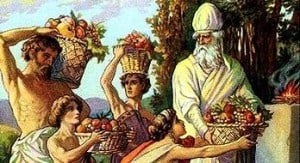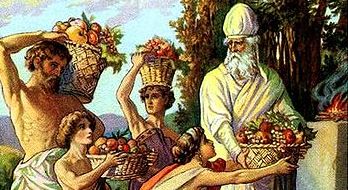 Parshat Ki Tavo (Deuteronomy 26:1–29:8) — This portion focuses on the centrality of joy in our lives and in our walk with our Creator.
Parshat Ki Tavo (Deuteronomy 26:1–29:8) — This portion focuses on the centrality of joy in our lives and in our walk with our Creator.
The Shorashim Torah Study and Overview Guide
Moshe tells the people that when you enter the land and begin to settle and cultivate it you must bring the first ripened fruits (bikkurim) of your orchard to the Holy Temple, and and make a “declaration of Thanks called a vidui.
“And it will be ( VEHAYA) , when you come into the land which the Lord, your God, gives you for an inheritance, and you possess it and settle in it, 2. that you shall take of the first of all the fruit of the ground, which you will bring from your land, which the Lord, your God, is giving you. And you shall put [them] into a basket and go to the place which the Lord, your God, will choose to have His Name dwell there” (Deuteronomy 26: 1-2).
As we have learnt in previous classes, the word “And it will be (VEHAYA)” which begins the verse is a code word for anticipated joy.
What Joy is anticipated considering the major part of the portion includes the Tochehcha or the great rebuke?
Why are the Bikkurim so important that we use it in our rendition of the Pasover seder rather than the verses that actually deal with the exodus from Egypt?
The text also describes more detail regarding the tithes given to the Levites and more detailed instructions on how to proclaim the blessings and the curses on Mount Gerizim and Mount Eva. Moshe then makes two very dramatic statements regarding the status of his people. The first:.
“Look down from Your holy dwelling, from the heavens, and bless Your people Israel, and the ground which You have given to us, as You swore to our forefathers a land flowing with milk and honey.( ibid 26:15)
And then:
You have selected HaShem this day, to be your G-d, and to walk in His ways, and to observe His statutes, His commandments and His ordinances, and to obey Him. And HaShem has selected you this day to be His treasured people, as He spoke to you, and so that you shall observe all His commandments,( ibid 26:17-18)
What is the deep import of the statement “Look down from Your holy dwelling, from the heavens?
What is the deep theological import of this mutual choosing
What is taught in the repeated phrase “this day”?
Then Moshe describes the list of 98 curses or admonishments that will befall the people should they stray from the path G-d has destined for them. illness, famine, poverty and exile. At the end Moshe says “because you did not serve HaShem, your G-d, with happiness and with gladness of heart, when [you had an] most of everything. (Devorim 28:47)
What is the difference between “happiness and gladness of heart”?
What does Joy have to do with it?
How is joy the center of all things?
Listen to this week’s podcast:
